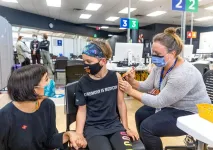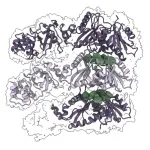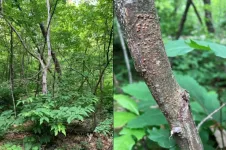(Press-News.org) If you started watching a movie from the middle without knowing its plot, you’d likely be better at inferring what had happened earlier than predicting what will happen next, according to a new Dartmouth-led study published in Nature Communications.
Prior research has found that humans are usually equally good at guessing about the unknown past and future. However, those studies have relied on very simple sequences of numbers, images, or shapes, rather than on more realistic scenarios.
"Events in real life have complex associations relating to time that haven't typically been captured in past work, so we wanted to explore how people make inferences in situations that are more reminiscent of everyday life," says senior author Jeremy Manning, an associate professor of psychological and brain sciences at Dartmouth and director of the Contextual Dynamics Lab at Dartmouth. "Real life experiences, unlike abstract sequences, often include other people."
For the study, participants watched a series of scenes from two character-driven television dramas, Why Women Kill on CBS and The Chair on Netflix. They were asked to either guess what had happened before each scene, or what would happen next.
Participants were consistently better at guessing what had happened before a just-watched scene than they were at guessing what would happen next.
The researchers found that participants' inferences were heavily influenced by references to specific past and future events in characters' conversations. Like people in real life, characters in both shows often talked about their past experiences and future plans. Since the characters in those two shows tended to talk more about their pasts, participants had more clues to work from to make inferences about past rather than future events.
To determine if this pattern of talking more about the past extends to other conversations as well, the team analyzed millions of dialogues in novels, movies, television shows, and more. They found that fictional and real people alike tend to talk more about their pasts than their futures. Even though we can make plans for the future, our memories only tell us about our past. Just as real people remember their prior experiences but not those in the future, so too do fictional characters, perhaps, in an effort by writers to help them appear realistic, according to the co-authors.
"Our results show that on average, people talk one-and-half-times more about the past than the future," says Manning. "And this seems to be a general trend in human conversation."
Prior research has referred to the phenomenon of remembering the past but not the future as the 'psychological arrow of time.' "This phenomenon also reflects that one knows more about their past than their future," explains lead author Xinming Xu, Guarini, a PhD student in the Department of Psychological and Brain Sciences and member of the Contextual Dynamics Lab. "Our study shows that a person’s asymmetric knowledge of their own life can be transmitted to others."
Ziyan Zhu at Peking University and Xueyao Zheng at Beijing Normal University also contributed to the study.
Manning is available for comment at: jeremy.r.manning@dartmouth.edu.
###
END
People infer the past better than the future, study finds
Conversations shape how we make guesses about the past and predict the future.
2024-10-02
ELSE PRESS RELEASES FROM THIS DATE:
Sexual and gender minorities more likely to experience life dissatisfaction, isolation, stress
2024-10-02
FOR IMMEDIATE RELEASE
Wednesday, October 2, 2024
Contact:
Jillian McKoy, jpmckoy@bu.edu
Michael Saunders, msaunder@bu.edu
##
Sexual and Gender Minorities More Likely to Experience Life Dissatisfaction, Isolation, Stress
A new study found that sexual and gender minority adults in the US were more likely to report multiple social risk factors than heterosexual and cisgender adults, highlighting the need for policies that advance the health and socioeconomic well-being of these groups.
Until last year, few national surveys collected information about the prevalence of social risk factors—individual-level adverse experiences such as food insecurity ...
In surgery for localized muscle-invasive bladder cancer, extended lymph node removal offers no survival benefit but does increase morbidity
2024-10-02
The SWOG S1011 randomized phase 3 trial found no significant improvement in disease-free or overall survival but a higher rate of grade 3-4 adverse events and an increased risk of death in the 90 days after surgery. The findings, published in NEJM, should establish a standard bilateral pelvic lymphadenectomy that includes the external and internal iliac and obturator nodes as the standard of care for these patients.
Final results from the SWOG S1011 randomized phase 3 clinical trial, just published ...
“Nature-First Cities”, a new book explores how to invite nature back home, without evicting people
2024-10-02
A new book from Cam Brewer, Herb Hammond and SFU Resource and Environmental Management director, Sean Markey explores a nature-directed approach to stewardship that enhances cities, restores our relationships with nature and helps to rebuild our relationships with each other.
Situated in the understanding that both people and nature belong in urban spaces, and guided by principles of nature, equity and density, Nature- First Cities offers a vision for reestablishing our relationship with nature in cities.
This book is of particular interest to urban planners, ...
Health care site- and patient-related factors influencing COVID-19 vaccination completion rates
2024-10-02
The COVID-19 vaccine, introduced in December 2022, played a critical role in reducing mortality and morbidity related to the pandemic globally. Yet, by 2023, only 70% of the US population had completed the primary vaccination series. While factors such as race/ethnicity, socio-economic status, geography and political affiliations have been linked to vaccination rates, its relationship with characteristics of health care delivery sites like community health care centers (CHCs), has not been explored. CHCs, which provide comprehensive primary care to low-income populations, including COVID-19 vaccines, are key players in ...
SwRI-built solar wind plasma sensor to help track space weather
2024-10-02
SAN ANTONIO — October 2, 2024 —The Southwest Research Institute-developed Solar Wind Plasma Sensor (SWiPS) has been delivered and integrated into a National Oceanic and Atmospheric Administration (NOAA) satellite dedicated to tracking space weather. SWiPS will measure the properties of ions originating from the Sun, including the very fast ions associated with coronal mass ejections that interact with the Earth’s magnetic environment.
NOAA’s Space Weather Follow On-Lagrange 1 (SWFO-L1) satellite will orbit the Sun at ...
Filament structure activates and regulates CRISPR-Cas ‘protein scissors’
2024-10-02
CRISPR-Cas systems help to protect bacteria from viruses. Several different types of CRISPR-Cas defense systems are found in bacteria, which differ in their composition and functions. Among them, the most studied proteins today are Cas9 and Cas12, also known as DNA or ‘gene scissors’, which have revolutionized the field of genome editing, enabling scientists to edit genomes and correct disease-causing mutations precisely.
Researchers from the Institute of Biotechnology at the Life Sciences Center of Vilnius University – ...
Environmental quality of life benefits women worldwide
2024-10-02
Global evidence has revealed that women’s environmental quality of life is key to their overall quality of life and health, according to a study published October 2, 2024, in the open-access journal PLOS ONE by Suzanne Skevington from the University of Manchester, U.K., and colleagues.
Gender inequalities in health-related quality of life are generally few and small, even in large surveys. Yet many generic measures limit assessment to quality of life overall and its physical and psychological dimensions, while overlooking internationally important environmental, ...
Satisfying friendships could be key for young, single adults’ happiness
2024-10-02
A new analysis assesses the heterogeneity of factors linked with happiness among single Americans who are just entering adulthood, highlighting a particularly strong link between happiness and satisfying friendships. Lisa Walsh of the University of California, Los Angeles, U.S., and colleagues present these findings in the open-access journal PLOS ONE on October 2, 2024.
Prior research suggests that Americans in their early 20s may be less happy, on average, than at other points in their lives. Meanwhile, a growing percentage of young adults are not in long-term romantic relationships, and researchers are increasingly studying single people as a distinct ...
Wild banana relatives of mainland Southeast Asia reveal hidden diversity and the urgent need to preserve nature’s genetic resources for future crops
2024-10-02
Wild banana relatives of mainland Southeast Asia reveal hidden diversity and the urgent need to preserve nature’s genetic resources for future crops
###
Article URL: https://journals.plos.org/plosone/article?id=10.1371/journal.pone.0307592
Article Title: Musa species in mainland Southeast Asia: From wild to domesticate
Author Countries: France, U.S., Vietnam, Lao P.D.R., China
Funding: This study was funded by the Sud Expert Plantes Développement Durable programme through the DivBa SEP2D project (AAP3-97) and the BforBB open science project supported by the Agropolis Fondation under the reference ID 1605-011 through the “Investissements ...
A century of data uncovers how chestnut blight has devastated the American chestnut - and how forest composition has evolved since - in Shenanoah National Park, Virginia
2024-10-02
A century of data uncovers how chestnut blight has devastated the American chestnut - and how forest composition has evolved since - in Shenanoah National Park, Virginia
###
Article URL: https://journals.plos.org/plosone/article?id=10.1371/journal.pone.0306748
Article Title: Floristic changes following the chestnut blight may be delayed for decades
Author Countries: U.S.
Funding: We were funded by the Washington Biologists’ Field Club. This is a small organization that gives out only a few small awards each year. We do not have a specific grant number associated with this award. ...
LAST 30 PRESS RELEASES:
A biological material that becomes stronger when wet could replace plastics
Glacial feast: Seals caught closer to glaciers had fuller stomachs
Get the picture? High-tech, low-cost lens focuses on global consumer markets
Antimicrobial resistance in foodborne bacteria remains a public health concern in Europe
Safer batteries for storing energy at massive scale
How can you rescue a “kidnapped” robot? A new AI system helps the robot regain its sense of location in dynamic, ever-changing environments
Brainwaves of mothers and children synchronize when playing together – even in an acquired language
A holiday to better recovery
Cal Poly’s fifth Climate Solutions Now conference to take place Feb. 23-27
Mask-wearing during COVID-19 linked to reduced air pollution–triggered heart attack risk in Japan
Achieving cross-coupling reactions of fatty amide reduction radicals via iridium-photorelay catalysis and other strategies
Shorter may be sweeter: Study finds 15-second health ads can curb junk food cravings
Family relationships identified in Stone Age graves on Gotland
Effectiveness of exercise to ease osteoarthritis symptoms likely minimal and transient
Cost of copper must rise double to meet basic copper needs
A gel for wounds that won’t heal
Iron, carbon, and the art of toxic cleanup
Organic soil amendments work together to help sandy soils hold water longer, study finds
Hidden carbon in mangrove soils may play a larger role in climate regulation than previously thought
Weight-loss wonder pills prompt scrutiny of key ingredient
Nonprofit leader Diane Dodge to receive 2026 Penn Nursing Renfield Foundation Award for Global Women’s Health
Maternal smoking during pregnancy may be linked to higher blood pressure in children, NIH study finds
New Lund model aims to shorten the path to life-saving cell and gene therapies
Researchers create ultra-stretchable, liquid-repellent materials via laser ablation
Combining AI with OCT shows potential for detecting lipid-rich plaques in coronary arteries
SeaCast revolutionizes Mediterranean Sea forecasting with AI-powered speed and accuracy
JMIR Publications’ JMIR Bioinformatics and Biotechnology invites submissions on Bridging Data, AI, and Innovation to Transform Health
Honey bees navigate more precisely than previously thought
Air pollution may directly contribute to Alzheimer’s disease
Study finds early imaging after pediatric UTIs may do more harm than good
[Press-News.org] People infer the past better than the future, study findsConversations shape how we make guesses about the past and predict the future.







